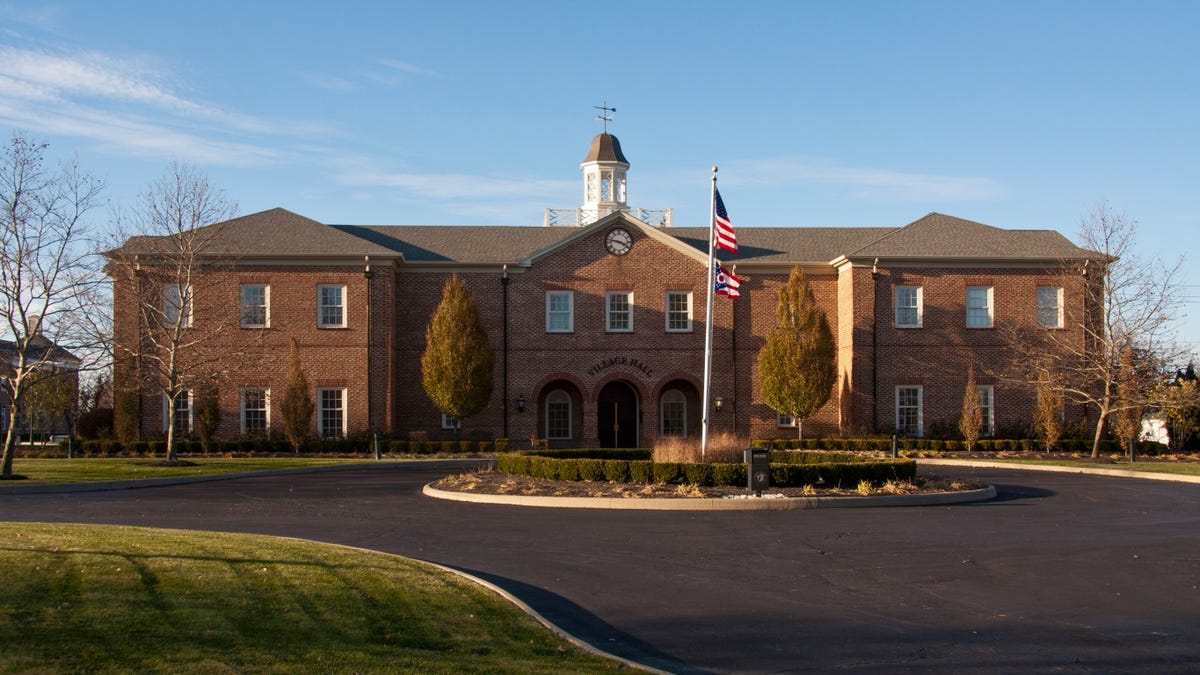World
Palestinian Americans watch with dread as family members in Gaza struggle to stay alive
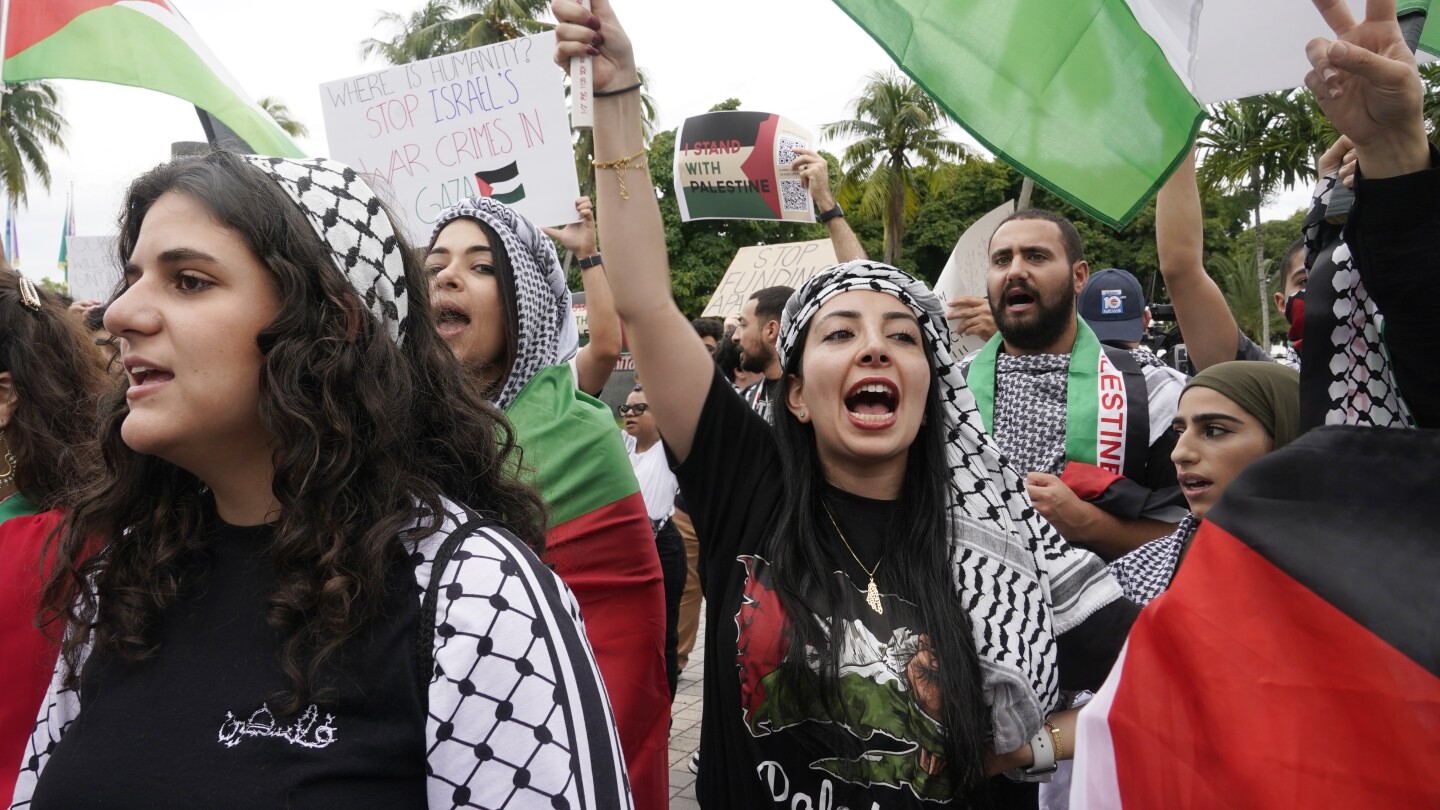
NEW YORK (AP) — For the unforeseeable future, Laila El-Haddad has one mission: to get the voices of her fellow Palestinians, along with their pleas for help, out to the rest of the world.
From her home office in Columbia, Maryland, El-Haddad frantically juggled phone calls this week from journalists seeking her expertise on Gaza and Palestinian Americans trying to get the attention of their local elected officials.
In between the calls, the 45-year-old mother and author checked WhatsApp, the global messaging application, for updates from her own family members in Gaza during their brief windows of electricity and internet access. Electricity was since cut off by Israel and internet outages have made it difficult for many to keep in touch.
“I’m just trying to stay sane by doing what I can to help,” El-Haddad said.
For many Palestinian Americans, there’s a sense of helplessness and hopelessness as they struggle to hear from loved ones in Gaza. Amid a fuel and water shortage, no electricity, and now a forced evacuation in the north, administering and sending aid to civilians in Gaza is near impossible.
Israel has bombarded Gaza with airstrikes for days and has threatened a ground invasion in response to Hamas’ attack on Israel that killed 1,300 last weekend. The Gaza Health Ministry said Saturday that over 2,200 people have been killed in the besieged territory in the last several days, including 724 children and 458 women. With a looming humanitarian crisis, that number is expected to rise.
But even before this week, getting to Gaza to visit family for Palestinian Americans was a lengthy, exhausting and difficult experience, and most people who live Gaza can never leave. Unlike Israeli Americans, Palestinian Americans say they have never been afforded the opportunity to freely help their loved ones in times of crisis.
Mohammad AbuLughod, who lives in a suburb of Milwaukee, received fragmented updates from a cell phone his family in Gaza kept charged via a solar panel. His family shared those messages with The Associated Press:
An elder in the family died from an airstrike. They tried to seek shelter in a United Nations school, before deciding to stay home. Schools were damaged by airstrikes. Children died. Buildings have been reduced to rubble. They don’t know if the neighbors are alive. They are all gathered now, three generations, in one house. When the bombs come, they will die together. No one will have to live alone.
“I feel I am living in a nightmare,” one relative wrote in a message to the family.
AbuLughod is at a loss for what to do. “There’s no way to send support, we can’t send them money and money would probably be useless, because there’s nothing to buy,” he said.
Deanna Othman’s young nephew in Gaza messaged her on Instagram to say it may be the last time he’s able to talk to her.
“How do you reply to that?” Othman, who lives in a suburb of Chicago, said in an interview with the AP. “How can you say anything to comfort someone who is facing their own mortality?”
Haneen Okal, a Palestinian American living in New Jersey, is currently stuck in Gaza with her three young children. She’d gone to Gaza while pregnant, after 9 years away to visit her family, and planned to travel back to New Jersey to deliver her baby. But after experiencing a medical emergency, she delivered her baby in Gaza in August, and has remained there since.
Minutes before she was set to leave Gaza through the Rafah crossing with Egypt earlier this week, Israeli airstrikes left the crossing inoperable. She and her children traveled back to the Rafah crossing on Saturday in the hopes that the U.S. government would allow for their safe evacuation. So far, she said, State Department officials have not told her if they will help her leave. Abdulla, Okal’s husband, is pleading with the U.S. government from New Jersey to bring his family home.
“There’s no place safe here in the Gaza Strip,” Haneen Okal said in a recorded video sent to the AP via WhatsApp. “My kids are feeling so scared. … Please help us get evacuated safely.”
Many Palestinian Americans watched in agony this week as Israelis abroad rushed to travel to Israel following the Hamas assault, signing up to fight in military reserve units or administer aid on the ground. Palestinian Americans say they’ve never had the option to do the same.
With the Gaza Strip, a sliver of land only 25 miles (40 kilometers) long with 2.3 million people, essentially dark and the Israeli blockade making delivering humanitarian aid even more challenging, those who have family in Gaza are left watching from afar, feeling powerless as their families struggle to find safety.
“It’s just too traumatic for me right now to see American citizens who, even predating this, have the privilege and the access to my country that my husband, a Palestinian whose own parents and grandparents were forced to flee from their homes, doesn’t enjoy,” said El-Haddad, the author in Maryland.
Othman and her family traveled from the suburbs of Chicago to Gaza this summer — a process she described as mentally, physically and bureaucratically difficult. Othman’s extended family lives in the Israeli-occupied Palestinian territory of the West Bank, but her husband’s family is in Gaza. If she wanted to visit her family in the West Bank, she’d have to go without her husband, who, like most people with a Gaza ID, cannot travel to the West Bank under the Israeli occupation.
“My family in the West Bank was only about 40 miles (64 km) away from me when I was in Gaza,” Othman said. “But the amount of effort it would have taken to get to them just wouldn’t have worked.”
Several years ago, during more peaceful times, Nahed Elrayes and his father tried for days to enter Gaza from Tel Aviv to catch his terminally ill grandmother’s final moments.
“The Israelis simply would not let us enter Gaza,” he said. On the third day of trying, Elrayes’ grandmother passed away and the Israeli forces finally allowed them entry to attend the funeral services.
“I will never forget being with my father that day,” Elrayes said. “There is no respect for our humanity.”
The story of so many Palestinian Americans is one of longing, loss and a sense that their history is being erased. Many Palestinian families are shaped by the history of becoming refugees relatively recently. Gaza is, in part, so densely populated today because of the mass exodus of Palestinians from what is now Israel during the 1948 war surrounding its creation.
It’s the echoes of the 1948 Nakba, or “catastrophe” that haunt AbuLughod and his family — refugees originally from the Palestinian town Yaffa, now Jaffa, Israel — as they watch the scenes of mass evacuation playing out from Gaza this week. The fear is that Palestinians in Gaza, like those who were forced to leave their homes in 1948, will never be able to return. For so many Palestinians who have experienced the loss of their land and homes, identity is all they have left.
“What’s heaviest at the moment is that the world is going to watch a group of people be killed mercilessly and pushed out, in real time, and believe it to be right and OK and just,” said Amirah AbuLughod, Mohammad’s daughter.
To cope with the dire outlook, Hani Almadhoun said he and his fellow Palestinian American colleagues at UNRWA USA are pouring themselves into their work supporting the U.N. agency for Palestinian refugees, trying to provide aid to people on the ground in Gaza despite the challenges. Eleven UNRWA staff members were killed in airstrikes in Gaza this week.
“There are no heroes right now in Gaza. Everybody’s damaged. Everybody’s burying somebody,” Almadhoun said. “And I hope I am wrong, but this is going to go on for a long time. A lot more people will lose their lives and then nobody’s going to be held accountable.”
____
Noreen Nasir is a New York-based member of the AP’s Race and Ethnicity team. Follow her on social media: twitter.com/noreensnasir.

World
Japan's soon-to-be prime minister faces big challenge as he tries to move past ruling party scandals
TOKYO (AP) — The person chosen Friday to lead Japan’s governing party, and become prime minister next week, is a veteran politician with deep policy experience, a taste for curry and anime — and big challenges ahead of him as he tries to unite a fractious party and hold off an opposition eager to capitalize on recent corruption scandals.
Shigeru Ishiba has long been popular with voters but has often struggled to win over his conservative fellow Liberal Democratic Party lawmakers.
A vocal critic of the hawkish politics of former Prime Minister Shinzo Abe, he was long seen as a troublesome outsider by some party members. That makes Friday’s victory a huge comeback for Ishiba. It could also signal a break from years of Abe’s influence over the party, even after the former prime minister’s assassination.
Some analysts believe that Ishiba was chosen as much for his image as a centrist who can counter challenges by the more liberal main opposition party as for his policy views.
The 67-year-old former banker was running in the party leadership race for a fifth time and had said this was going to be his “final battle.”
Ishiba was first elected to parliament in 1986, after being influenced by the late Prime Minister Kakuei Tanaka, who was popular with the public. He has served as defense minister, agriculture minister and in other key Cabinet posts, and as the LDP secretary general under Abe.
His party will now look for him to use his experience, stability and expertise to beat back the main opposition Constitutional Democratic Party of Japan, which recently chose as its new leader former Prime Minister Yoshihiko Noda, a veteran known for his inspiring speeches.
University of Tokyo politics professor Yu Uchiyama said political parties tend to make centrist shifts to win elections, and Ishiba could do well in an upcoming parliamentary face-off with the opposition leader.
Considered a defense policy expert, Ishiba has proposed an Asian version of the NATO military alliance and a more equal and mutual Japan-U.S. security alliance, including having Japanese Self Defense Force bases in the United States.
Ishiba is a supporter of Taiwan’ s democracy. He calls for the establishment of a disaster management agency in one of the world’s most disaster-prone countries.
Ishiba has vowed to push for more diversity and gender equality. He supports a revision to a 19th century civil code that requires married couples to choose one of their surnames. That has caused most women to adopt their husband’s surname. Moves to change the code have stalled for decades because of LDP opposition.
At a recent speech in Tokyo, Ishiba said Japanese women are among the shortest sleepers in the world because of their heavy responsibilities both at work and home. He said most husbands, including himself, hardly help with childrearing and homemaking.
Ishiba also supports legalizing same-sex marriage.
Ishiba is known as a policy “otaku,” or nerd, especially in security and defense issues. He likes anime, building model warships and listening to 1970s and ‘80s Japanese pop songs. He says his favorite food is curried rice.
World
Hezbollah stores weapons among civilians in Lebanon, US says its not sharing intel with IDF
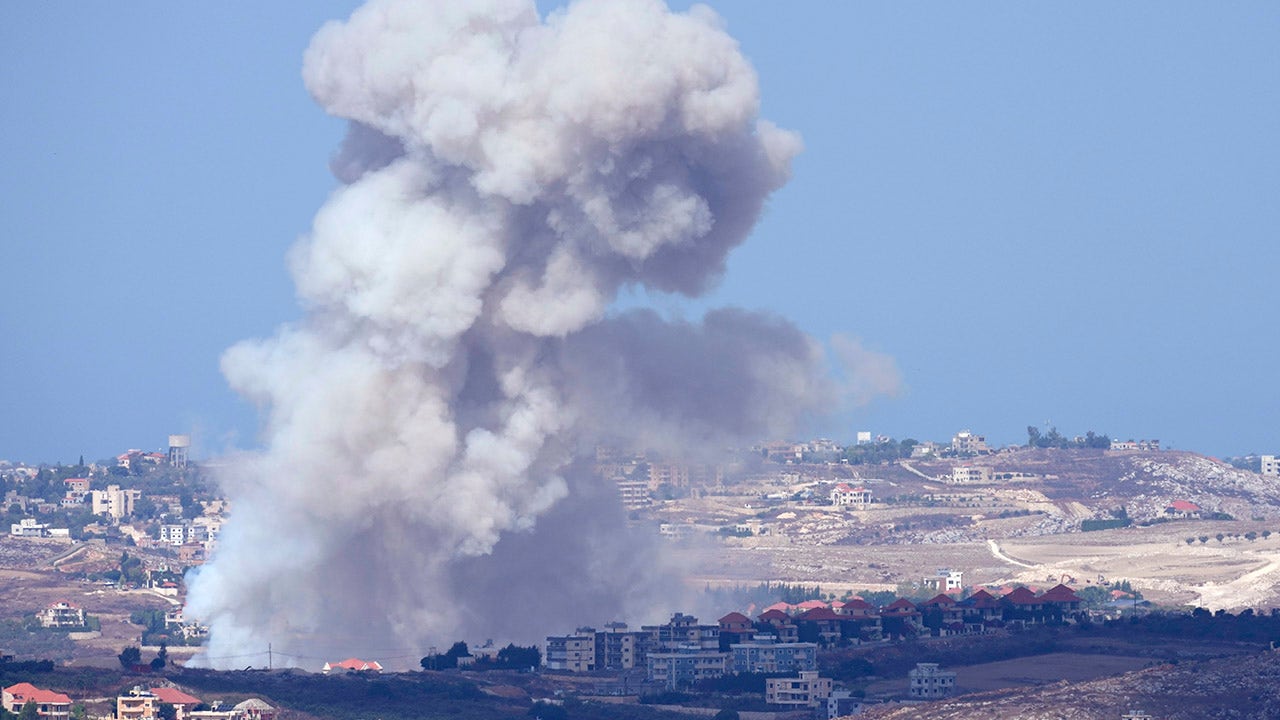
The fighting between Israel and Hezbollah has drastically escalated over the last month as the Israel Defense Forces (IDF) has begun targeting the terrorist network’s hot spots and military storage units, all of which are strategically embedded within civilian villages.
Images and videos provided to Fox News Digital of the recent strikes in southern Lebanon show precision missiles hitting what have been deemed civilian buildings.
Hezbollah’s use of civilian infrastructure has not only created a sophisticated network of meeting houses, weapons storage units and well-hidden missile launching positions across southern Lebanon and in the suburbs of Beirut, it has ensured a war with Hezbollah cannot be conducted without immense collateral damage.
ISRAEL READIES RESERVE TROOPS ON BORDER WITH LEBANON: ‘PREPARE YOURSELVES’
Hezbollah rockets are stored in a building somewhere in Lebanon. (IDF Spokesman’s Unit. )
Since Monday, more than 1,800 casualties have been reported and at least 560 people are believed to have been killed, including 50 children and more than 90 women, according to the Lebanese Health Ministry.
On Thursday, the U.S. again urged Israel to agree to a cease-fire in Lebanon, and deputy Pentagon press secretary Sabrina Singh confirmed with reporters that the U.S. is not aiding Jerusalem militarily or with intelligence in its Lebanon-based campaign.
Israeli Prime Minister Benjamin Netanyahu has rejected the international community’s calls for a cease-fire and instead instructed his troops to continue fighting “with full force.”
French President Emmanuel Macron on Wednesday warned Israel that it “cannot without consequence just expand its operations to Lebanon” as commanders on the Israeli-Lebanon border ordered its troops to “prepare” for a possible ground invasion.
No invasion has been ordered at this time, though Israeli and U.S. security experts have told Fox News Digital that the network Hezbollah has established on the foundation of everyday life within Lebanon means war with the terrorist network will likely be even more costly in terms of human lives than what has been witnessed in Gaza.

Smoke rises from Israeli airstrikes on villages in the Nabatiyeh district, seen from the southern town of Marjayoun, Lebanon, on Monday, Sept. 23, 2024. (AP Photo/Hussein Malla)
According to the Israel-based Alma Research and Education Center, a nonprofit organization that researches Israeli security challenges along the border with Lebanon, Hezbollah has long relied on the use of civilian infrastructure to serve its needs.
ISRAEL-HEZBOLLAH WAR: NETANYAHU ‘DID NOT EVEN RESPOND’ TO US CEASE-FIRE DEAL, PLEDGES TO FIGHT ‘FULL FORCE’
“The phenomenon of renting houses, rooms, warehouses within the Shiite civilian areas by Hezbollah is well known since the beginning of the 2000s,” Tal Beeri, head of the research department at Alma, told Fox News Digital, adding that the terrorists also rent structures in non-Shia areas of Lebanon as well.
“Evidence of this matter was found in looted documents and investigations of Hezbollah operatives during the Second Lebanon War in 2006. Since then, Hezbollah has only accelerated the phenomenon and estimates are that every third house in southern Lebanon has been used by Hezbollah for its needs,” he added.
Beeri shared research with Fox News Digital that showed findings from 2021 breaking down the sophisticated system in which Hezbollah has intertwined itself in the everyday running of local villages across the country.
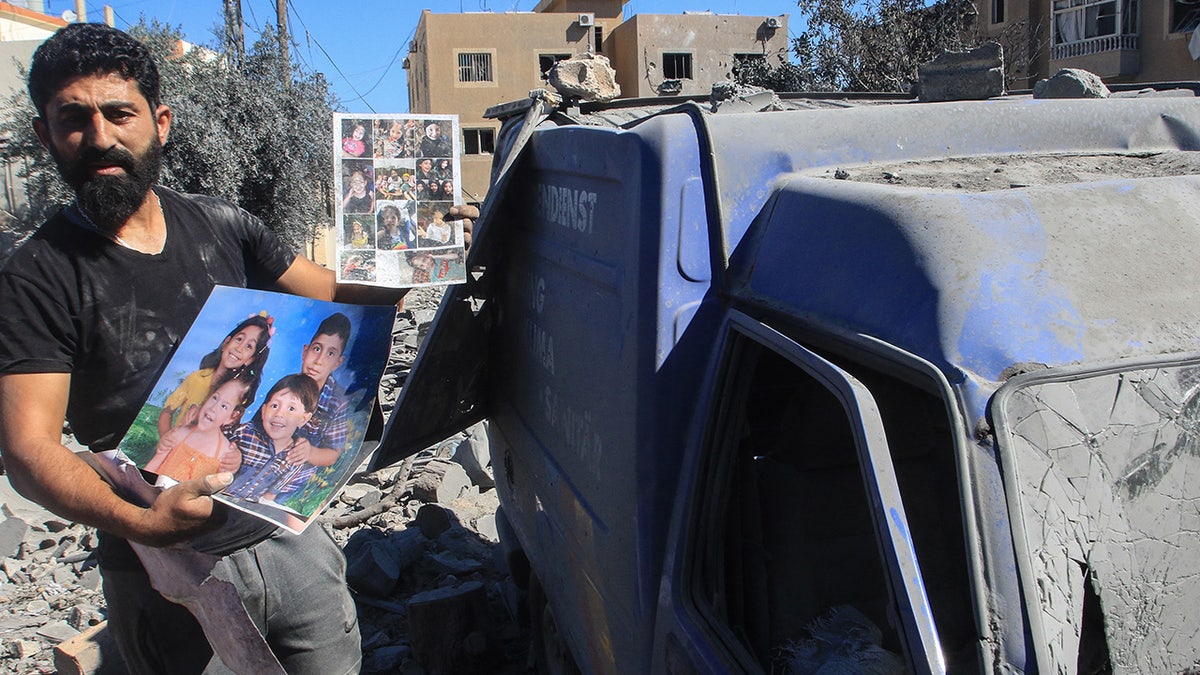
A man displays photographs as people sift through the rubble of a building in an area targeted overnight by Israeli airstrikes in Lebanon’s town of Saksakiyeh, on Sept. 26, 2024. Israel flatly rejected on Sept. 26 a push led by key backer the United States for a 21-day cease-fire in Lebanon, as it vowed to keep fighting Hezbollah militants “until victory.” (Photo by MAHMOUD ZAYYAT/AFP via Getty Images)
Hezbollah officials dubbed a “Rabat” – loosely translated to “the liaison” – are installed in villages across Lebanon and serve as the representative of the terrorist group, facilitating the needs of the villagers in coordination with the hyper-localized operations of Hezbollah.
The Rabat, which can oversee multiple villages, reportedly establishes relationships with the residents by facilitating requests for aid such as money, food and even with localized disputes.
“In places where Hezbollah decides to expropriate or lease civilian land or properties from the residents for the purpose of its military activities, the ‘Rabat’ conducts the expropriation or leasing procedure vis-à-vis the relevant resident,” Beeri found.
The report, based on documents seized following the 2006 war with Hezbollah, found that the Rabat also recommended to local Hezbollah units the best locations in each town that are “suitable to serve the human shield tactic” based on the storage requirements surrounding concealment, infrastructure type and weapons placement.
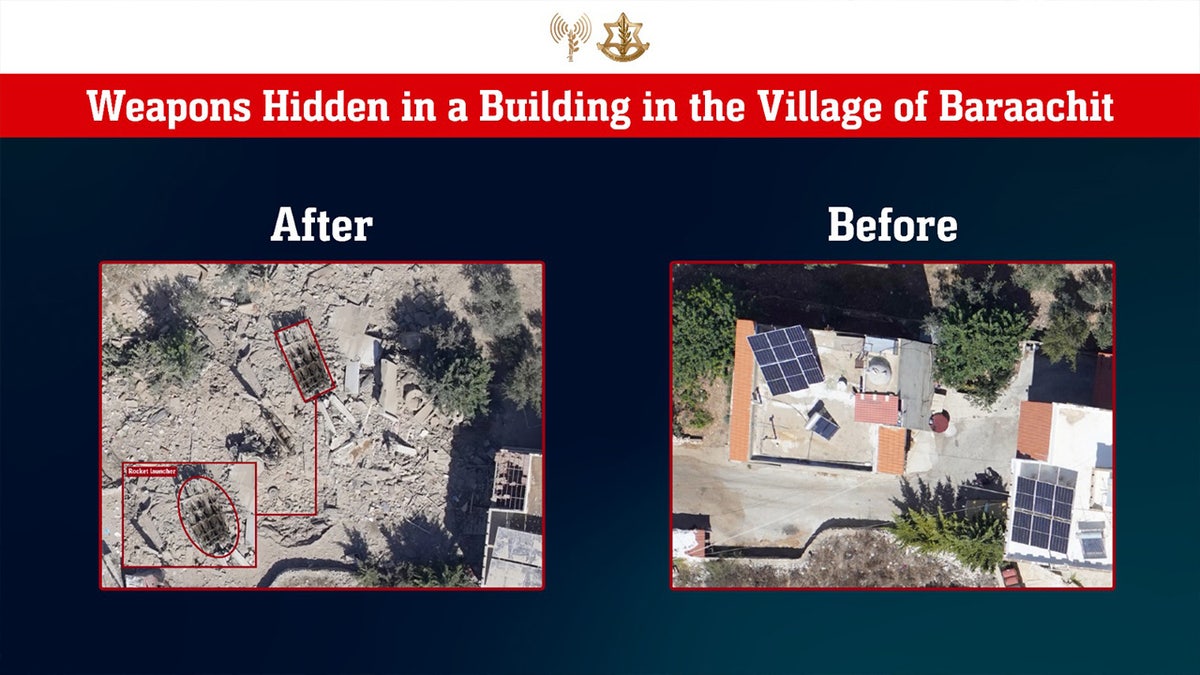
Images show civilian buildings used by Hezbollah in Lebanon to store weapons. (Photo provided by Israel Defense Force)
The Rabat then coordinates the logistics between the terrorist organization and the local property owner.
“The ‘Rabat’ strengthens Hezbollah’s grip on the Lebanese village residents’ day-to-day life, their property, and needs, allowing Hezbollah to turn them into human shields on a wider scale,” the report found.
Hezbollah’s control over local communities and its ability to stockpile and transfer weapons throughout the country through a sophisticated tunnel system signifies that the UN Resolution 1701 passed in 2006 to prevent a third war between the terrorist network and Israel has failed.
While it remains unclear if U.N. Security Council members are looking to revamp the resolution to counter the terrorist group’s movements and stop Israeli operations in civilian areas, the international community has called on Netanyahu to cease his campaign – many leaders from both adversary and allied nations, have fervently warned against invading Lebanon.
Netanyahu is set to address the U.N. body on Friday during what has been described by the Israeli ambassador to the U.N. as the most “hostile” environment he has seen in his roughly 10 years of attending the top summit.
World
Is the EU's forest protection law becoming Brussels' next nightmare? | Radio Schuman
In an interview with Euronews, the outgoing European Commissioner for Environment, Ocean and Fisheries Virginijus Sinkevičius said that he finds very ‘difficult’ to understand why the position on the deforestation law has changed significantly after its approval.
-

 News1 week ago
News1 week agoSecret Service Told Trump It Needs to Bolster Security if He Keeps Golfing
-

 Business1 week ago
Business1 week agoU.S. Steel C.E.O. Says Nippon Deal Will Strengthen National Security
-

 Politics1 week ago
Politics1 week agoNew House Freedom Caucus chair reveals GOP rebel group's next 'big fight'
-

 News1 week ago
News1 week agoToplines: September 2024 Inquirer/Times/Siena Poll of Pennsylvania Registered Voters
-

 News1 week ago
News1 week agoDisney trips meant for homeless NYC students went to school employees' families
-

 Politics1 week ago
Politics1 week agoBiden admin moves to reinstate Trump-era rule, delist gray wolves from endangered species list
-

 Politics1 week ago
Politics1 week agoDem lawmakers push bill to restore funding to UN agency with alleged ties to Hamas: 'So necessary'
-

 World1 week ago
World1 week agoWhat’s South Africa’s new school language law and why is it controversial?






